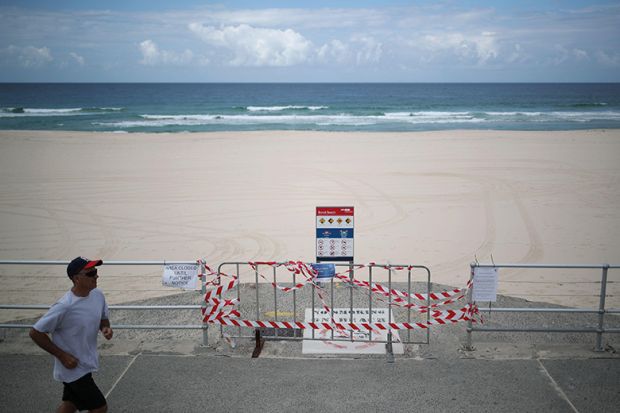Australian universities are in the dark about the regulation of course delivery to international students, after Covid shifted views about online learning.
Chinese enrolments at Group of Eight universities increased during pandemic border closures, indicating strong appetite for remote delivery. But Australian rules dictate that foreigners on student visas can take no more than one-third of their courses online, with at least one unit attended face to face every study term.
Early in the pandemic, the Tertiary Education Quality and Standards Agency (Teqsa) promised to enforce this requirement in a “flexible” way. Provided other standards were met, online delivery would “not form an impediment to attainment of an Australian qualification”.
Last November, with Australia’s borders about to reopen, Teqsa said it would review its flexible approach in mid-2022. But it has not done so yet. A Teqsa spokesman declined to say when the review would take place or whether changes to the limits on online delivery were being considered.
THE Campus views: After the gold rush - how to respond to the Chinese student downswing
The federal education department is also looking at the issue as part of its review of the Education Services for Overseas Students (Esos) framework. A February discussion paper asked whether online limits should be revisited, noting that Covid had accelerated “growth and innovation in online delivery” and “highlighted the need to embrace new ways of engaging with students…to remain globally competitive”.
The review’s final report was due with the government in mid-2022, but has not been delivered. The department would not say when the report would be finalised, if it would be made public or whether it would recommend different limits on online delivery.
The impasse is frustrating academic leaders. University of Technology Sydney (UTS) deputy vice-chancellor Iain Watt said the sector needed clarity. He said campuses had experienced a “change in mindset”, with those most sceptical of online education “now persuaded” that it could be as good as or better than face-to-face delivery.
This presented new opportunities for universities, but they had to move fast. “We’ve got to start developing those products, pathways and relationships now. But we’ve got to do it in complete ignorance of…what the regulatory framework is going to be,” Mr Watt said.
The limits on online delivery do not apply to students who study their entire courses remotely without obtaining visas. But university administrators would like the flexibility, for example, for students to undertake the first year or two of their degrees from their home countries.
“The chance of learning from home, without the expense of coming to Sydney, offers a real option for…international students,” said Shirley Alexander, UTS’ deputy vice-chancellor for education and students.
Andrew Carter, Australia’s Beijing-based trade commissioner for education, said Chinese consumers were showing “increasing acceptance and recognition of the advantages of online and hybrid learning”.
But Karen Welsh, Australia’s minister counsellor for education and research in Beijing, cautioned that China’s decision to validate foreign degrees delivered online was “a temporary measure” during the pandemic. “They’re very concerned about the quality…and student experience of online learning,” she said.
Tertiary education consultant Claire Field said “some loosening” of the limits on online delivery was possible in Australia. “But I doubt it will be a wholesale change. Most stakeholders want to see international students on campus.”
Australia’s approach mirrors that of northern hemisphere competitors. The US usually limits foreigners on student visas to one online class per semester, but relaxed this rule for pre-enrolled students from March 2022 and is maintaining this flexibility during the 2022-23 academic year.
The UK has also allowed foreigners on student visas to study remotely during the pandemic, although this concession ends on 30 June, with student visa holders required on campus from July.
However, Canada places no restriction on online delivery to international students and has jettisoned rules barring fully online students from qualifying for post-study work permits.





